Today The New York Times published their list of 100 notable books of 2020—and while plenty of our favorites made the cut, we were surprised to see there was only one short story collection on the list. Susan Minot’s Why I Don’t Write: And Other Stories, the lauded collection, is wonderful; but far more than one thrilling, insightful short story collection was published this year. To that end, here are a few more of our favorites:
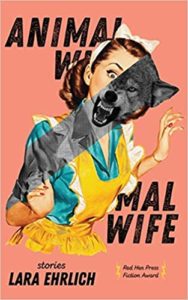
Lara Erlich, Animal Wife (Red Hen Press)
“My mother said girls have to take care of themselves. That’s how we avoid turning into sea foam and falling down wells. That’s how we escape hunters and kings who chop and carve and snip and steal.” These sentences, coming in the middle of the first story of Lara Ehrlich’s stunning debut collection Animal Wife, set the tone for what is to follow, as her characters assert their agency under oppressive conditions and in a world that is often fantastical. These stories, and Ehrlich, are remarkable, and the collection is a standout in a season full of amazing new releases. –Corinne Segal, Lit Hub senior editor
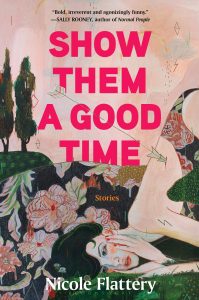
Nicole Flattery, Show Them A Good Time (Bloomsbury)
Flattery is a rising star back in the UK and Ireland (where she already has a heap of awards to her name), and with very good reason. Her debut collection is a magnificently mordant work, full of delicious one-liners, perennially creeping menace, and hypnotically nihilistic depictions of cold-eyed young women trapped in strange, lonely, sometimes dystopian situations, often surrounded by predatory or unhinged older men. In one story, “Hump,” an office worker develops a hunchback after her father’s death. In another, “Abortion: A Love Story,” two female college students join together to tell their stories in the format of a play. Reminiscent of the writing of Mary Gaitskill, Lorrie Moore, and Ottessa Moshfegh, Show Them a Good Time is a deft and dazzling work of pitch-black humor and deep, disquieting sorrow. –Dan Sheehan, Book Marks Editor
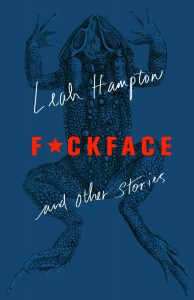
Leah Hampton, F*ckface (Henry Holt)
Leah Hampton writes about “Appalachia, corpses, rurality, and smart women,” as says her bio, a fact which her debut collection F*ckface corroborates. F*ckface sure has grit—complemented by great compassion, wit, and ingenious connections between startlingly unrelated subjects. The title story features a queer young woman who comes to learn more about herself than she expected: it turns out she has more in common with the dead bear behind the store where she works than she ever would have thought. “Meat” is set during a funeral: “It was early autumn, that hushed, forthright season, and the chapel hummed with good, clean, true grief.” The protagonist Allison, a student of agriculture, is visiting her uncle, who takes it upon himself to tell the community about his niece’s undertakings. Hampton switches the narrative between the funeral (“The air in the church was dense with flesh.”) and Alison’s hellish, past internship in the slaughterhouse—both of which share an atmosphere of squalor that makes the reader squirm, while marveling at Hampton’s piercing prose. Leah Hampton really sees people. So this allows her, without any pretenses, to deliver a hell of a story. –Eleni Theodoropoulos, Lit Hub Editorial Fellow
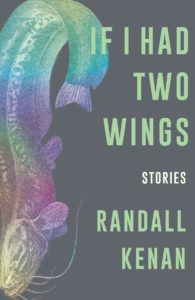
Randall Kenan, If I Had Two Wings (Norton)
Randall Kenan has taken a nearly 30-year break from publishing short fiction. Let the Dead Bury the Dead, his linked 1992 collection, unfolded the tales of real life Tims Creek, a corner of North Carolina that one of its residents explains in the book was founded as a “maroon society,” a place so off the beaten path no one would disturb the runaway slaves who settled there. Supernatural and odd, full of the living dead and fairy tales that will raise your hair, the book took southern gothic and exploded it on the spot. For almost 30 years Kenan worked in nonfiction, rewriting The Fire This Time, traveling the US, from Alaska to Maine, collecting oral histories of African Americans. Now Kenan has returned to Tims Creek and more tales to tell. They involve a man at a nursing home, a rich man haunted by a pig, and a woman in the last years of her life who turns into a miracle worker. What a joy it is to have Kenan back in the teller’s seat. –John Freeman, Lit Hub Executive Editor
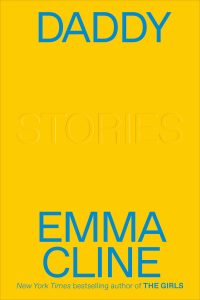
Emma Cline, Daddy (Random House)
I must confess that I never got around to reading The Girls—Emma Cline’s blockbuster 2016 novel about a listless California teenager who gets sucked into the orbit of a Manson-like cult—but after reading Daddy, the author’s dark and brilliantly disquieting debut story collection, I fully intend on adding its predecessor to my TBR pile. Cline’s sharply-drawn characters are the cowed, contemplative survivors of self-inflicted trauma, both seismic and quotidian—from the father whose past anger issues have irreparably damaged his relationship with his daughter, to the nanny hiding from the paparazzi after the affair with her movie star boss is discovered, to the radioactive editor fleeing a workplace sexual misconduct scandal. We join them in the paralyzed aftermath—elegantly conjured limbos where regret is a constant companion. This all sounds dour, and I suppose it is, but Cline writes with such grace and precision that every sentence is a joy to absorb. –Dan Sheehan, Book Marks Editor
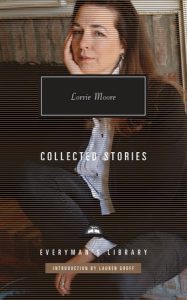
Laurie Moore, Collected Stories (Everyman’s Library)
She is the helium which has been piped into the short story, the writer who has done the rare thing in American humor: turning the mundane extraordinary, rather than the other way around. Now, at last, all four of Lorrie Moore’s collections have been stuffed into one big, delicious book. What a gift this will make to readers and young writers. All the holiday charade parties run amok, the love affairs that fall on characters like a safe from the sky. The shattering trips to the ER with children. To read Moore’s stories is to feel the ecstatic, terrifying lightning zot of being alive. The risk and the companionship of being in a world where the rewards are few. She makes her bleakness a cozy blanket, so gorgeously made. There’s not a boring sentence in the 776 pages here. And very few writers work in prose transfer this kind of energy from brain pan to reader. –John Freeman, Lit Hub Executive Editor
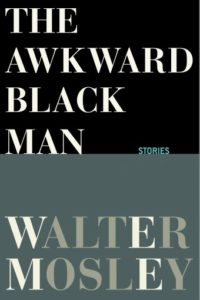
Walter Mosley, The Awkward Black Man, Grove Press
Reading these stories, you feel as if you’re sitting with a gifted storyteller while he spins yarns about the strange people living in his mind. The prolific Mosley delights in the wonderfully bizarre … Each protagonist seems simple and often shallow on the surface, but as the story progresses he unfurls into greater and frankly breathtaking complexity. –Rion Amilcar Scott, The New York Times Book Review
Read an excerpt of The Awkward Black Man here.
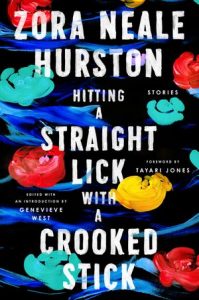
Zora Neale Hurston, Hitting A Straight Lick with a Crooked Stick (HarperCollins)
Thank God for archives. In 2016, Amistad at last released Zora Neale Hurston’s Baracoon, which grew out of her interviews with Cudjoe Lewis, the last remaining survivor of the Middle Passage. The book, written in the 1940s, had languished unpublished in the Alain Locke collection archives at Howard University. Not long ago, a handful of short stories from very early in Hurston’s career also turned up in the infrequently visited stacks of a research library. Here they are now as Hitting a Straight Light with A Crooked Stick, and they do not need any dusting off . . . Read longitudinally, eventually leaving Florida and coming to Harlem, the collection feels like a narrative-based parallel to Jacob Lawrence’s Migration series, only here there’s a variety of sound and texture to the gesture, as if Hurston knew from the beginning how important it was for sound to migrate too, from country to the city, from speech into books. As a result, in her pages, Harlem sounds more like itself: a place full of people from far away, trying and failing to unlearn where it was they were from. –John Freeman, Lit Hub Executive Editor
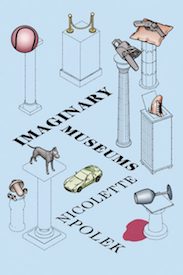
Nicolette Polek, Imaginary Museums (Soft Skull Press)
When an oyster gets a splinter, it produces a pearl. (Its organs create a hard shell around the foreign object.) This is what the stories in Nicolette Polek’s debut collection remind me of. It’s a world we recognize, but something is always off. In the first story, a woman carries a rope barrier with her everywhere, to separate herself from the world. In another, at the supermarket, “a group of people circle their carts around a watermelon display like a death dance.” Both halves of a couple want to go dancing, but they stay in instead for fear of dragging the other out of their comfort zone. Imaginary Museums reads like a kind of Twilight Zone, in which everyday people living their everyday lives find themselves in a prison of their own making. There’s something dark about them, but then you turn the page and find yourself laughing at her dry wit. Each story is tightly coiled, brightly polished, and they’re all a delight to discover. –Katie Yee, Book Marks Assistant Editor
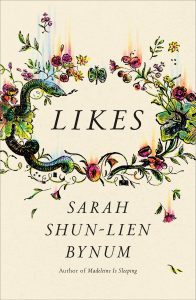
Sarah Shun-Lien Bynum, Likes (FSG)
Certain authors have such mastery over the short story form that you never forget the first time you read their work … Likes lays out bread crumbs for the reader to follow, the fairy-tale reference deliberate given that several of the stories play on those weird fables we tell children … Shun-lien Bynum allows her characters to believe they’ve seen the truth, but shows her readers that the characters — like us — rarely get it right. Likes is a short-story collection you should read slowly, but it’s so good, each story at such a high-wire level, that you’ll wind up tearing through it and wishing for more. –Bethanne Patrick, The Washington Post
Read an excerpt of Likes here.
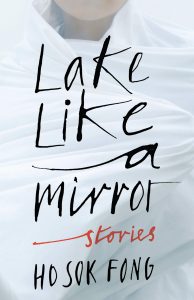
Ho Sok Fong, tr. Natascha Bruce, Lake Like a Mirror (Two Lines Press)
How must a Malay woman live in a strict religious society? This question is explored throughout Chinese Malaysian author Ho Sok Fong’s second short story collection (and first translated into English), Lake Like a Mirror. Ho slips between narrators, perspectives, and stylistic modes in ways that suggest just how surreal and malleable political and social arrangements really are. Two of Ho’s stories are set in rehab centers for women “judged guilty of licentiousness, deviant ideology, gender confusion, apostasy.” Ho’s women are bored, damaged, and censored, and translator Natascha Bruce helps bring these stories to life by reimagining the author’s concise, eerie writing. –Aaron Robertson, Lit Hub Assistant Editor
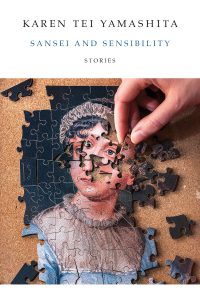
Karen Tei Yamashita, Sansei and Sensibility (Coffee House)
Karen Tei Yamashita is one of America’s great unsung geniuses. I, Hotel, a multi-character driven tale of housing in San Francisco and the people fighting for it, is a noisy modernist masterpiece that proves the novel really can accept everything you throw it—recipes, social commentary, crazy bento box construction—and not only hold up, but sing. In each one of her books Yamashita tries on a new construction technique. Here she’s mapped a series of stories onto the plots of Jane Austen novels, telling the tales of Japanese immigrants to the United States through the lens of their shared themes: inheritance, marriage, familial heritage. Entering her seventies, Yamashita is writing some of her finest stories yet. –John Freeman, Lit Hub Executive Editor
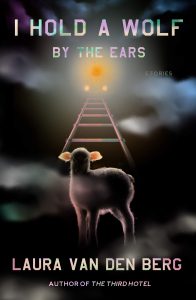
Laura van den Berg, I Hold A Wolf by the Ears (FSG)
On the heels of her 2018 novel The Third Hotel—a brilliant, mesmerizing grief odyssey in the spirit of Pedro Páramo and David Lynch that I couldn’t shake for days after finishing—Laura van den Berg’s ghostly new short story collection confronts “misogyny, violence, and the impossible economics of America” though a focus on women teetering over the edge. Already named one of the most anticipated books of 2020 by Entertainment Weekly, Oprah Magazine, and the BBC, readers of I Hold a Wolf by the Ears can expect more of van den Berg’s vivid atmospherics, bitingly dark humor, and grimly profound meditations on the human condition. –Dan Sheehan, Book Marks Editor

Lidia Yuknavich, Verge: Stories (Riverhead)
In her latest collection of short stories, Lidia Yuknavitch addresses the themes that most interest her, that exist on the verge—as her title says—or on the boundaries between sex and trauma, art and violence. Verge is full of suspense, directed with empathy at describing the psychology of the marginalized. An eight-year-old becomes an underground courier of frozen organs across Eastern Europe; a janitor takes trash and assembles it into a miniature city, a creation which ultimately frightens him. Young or old, male or female, the characters in Verge will shock and impress themselves onto the reader. Yuknavitch has after all been called a “galvanizing” voice in American fiction. –Eleni Theodoropoulos, Lit Hub Editorial Fellow
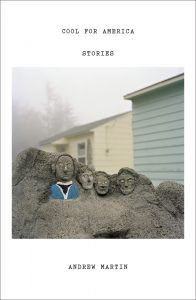
Andrew Martin, Cool for America (FSG)
If you read Martin’s excellent debut novel Early Work, you will recognize the themes (millennial ennui, underemployment, oveducation, a tendency to think too hard and do too little) of his winning first collection—and perhaps some characters (Leslie, Kenny, even Kiki and Scruggs). Mostly published in The Paris Review, these stories are perceptive slices-of-anxiety that will be uncomfortably, ecstatically recognizable to anyone who has ever considered themselves an intellectual—especially if it was sometime in the 2010s. –Emily Temple, Managing Editor
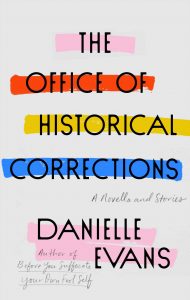
Danielle Evans, The Office of Historical Corrections (Riverhead)
“What makes a good short story? Danielle Evans’ dynamite new collection proves a study in the form. Slices of life, each piece in Corrections captures its own mood, hums to distinct rhythms, and locates unique spaces for empathy and pain and catharsis. They’re also delectably readable, propulsive accounts of loss and fear and redemption that twist with O. Henry-level glee… the titular novella to finish the book, a masterpiece of tension and mystery rooted in one woman’s swirling investigation of a racist tragedy from the past. Though, of course, as every story here reminds, the past is never too far away. –David Canfield, EW
Read our interview with Evans here.
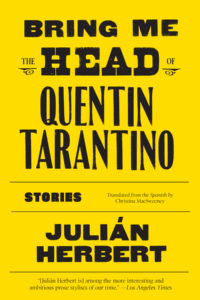
Julián Herbert, tr. Christina MacSweeney, Bring Me the Head of Quentin Tarantino: Stories (Graywolf)
“Electrifying … [an] impressive assemblage … Beyond the death and destruction, Herbert certainly knows how to cultivate erudite narrative company … Reunited with award-winning translator Christina MacSweeney, Herbert presents 10 stories ready to disturb, quite possibly even disgust. That said, even for the most reluctant readers, the surprisingly immersive humor and slyly playful wit make resistance futile.” –Terry Hong, Shelf Awareness
Read “White Paper,” a story from the collection, here.
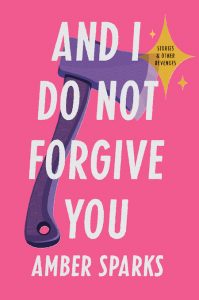
Amber Sparks, And I Do Not Forgive You (Liveright)
In college, a wonderful professor introduced me to Angela Carter’s The Bloody Chamber and Luisa Valenzuela’s Symmetries, collections of short fiction that both draw and comment upon culturally ubiquitous fairy tales like “Little Red Riding Hood” and “Bluebeard.” I’ve since become a ravenous reader of such stories—the sort that whittle away at conventional narratives and tropes, rendering them at once known and dazzlingly strange. So it’s no surprise that I’m excited for Amber Sparks’s new collection to make its way into the world, which, as author Ling Ma says, showcases Sparks’ “startling kaleidoscopic vision” as she “recast[s] familiar heroines in their own stories.” I would like to sit next to Sparks at a nighttime campfire as she spins her irreverent and incandescent tales, but if I can’t do that, devouring And I Do Not Forgive You will more than suffice. –Rachel Vorona Cote, Lit Hub contributor
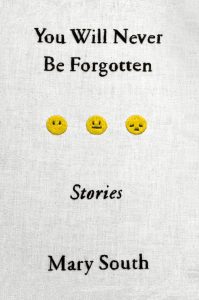
Mary South, You Will Never Be Forgotten (FSG Originals)
After having read several of the stories in this book, to say that Mary South’s fiction collected here isn’t relaxing, isn’t escapism, would be an understatement. But neither was Uncut Gems and I was all for it. These stories are about tech-enabled delusion, dread and self-soothing; they are distressing and can be triggering. But there is a lot of merit in good, inventively-crafted stories about murky tech, especially when they are peppered with Easter eggs of humanity and connection—think the best Black Mirror episodes. The New Yorker and the White Review have sneak peeks. –Marta Bausells, Lit Hub European editor at large
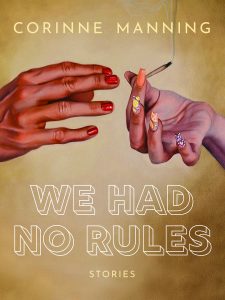
Corinne Manning, We Had No Rules (Arsenal Pulp Press)
When it comes to Corinne Manning’s collection We Had No Rules, I’m not entirely unbiased — we published an early version of one of the stories contained within here at Vol.1 Brooklyn a few years ago. Manning’s fiction deftly explores complex emotions and relationships, and I’m eager to read an abundance of their work in once place. Plus: great cover artwork never hurt. –Tobias Carroll, Lit Hub contributor
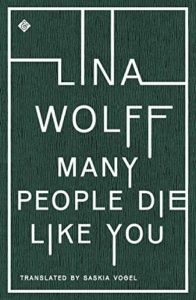
Lina Wolff (tr. Saskia Vogel), Many People Die Like You (And Other Stories)
Lina Wolff’s The Polyglot Lovers (translated by Saskia Vogel) was one of my favorite books of 2019, an absolutely savage and brilliant novel that pivots around each turn with impeccable grace. In this new collection Many People Die Like You, Wolff and her translator Vogel are again an insolent and propulsive force, and in each story, they achieve a levity, wit, and danger that can simultaneously make everything a joke and make that joke life or death. –Nate McNamara, Lit Hub contributor
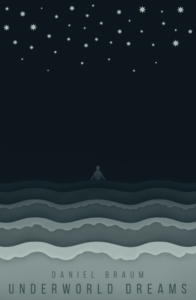
Daniel Braum, Underworld Dreams (Lethe Press)
With the month of October upon us, I’d be remiss if I didn’t recommend something on the uncanny side of the literary spectrum. Daniel Braum’s collection Underworld Dreams fits that bill pretty neatly—Braum is acutely aware of the genre’s history and tropes, but he’s also using both to tell stories that are deeply modern. It doesn’t hurt that he has a way with titles—including “Rebbe Yetse’s Shadow” and “Between Our Earth and Their Moon.” –Tobias Carroll, Lit Hub contributor
